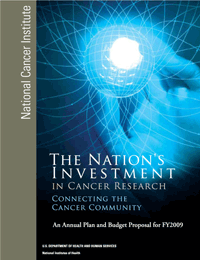
Budget Proposal Highlights Cancer Research Progress, Priorities
 Among the most valuable communication tools created as a result of the National Cancer Act of 1971 is the NCI's annual report on The Nation's Investment in Cancer Research, which was released this week. Often referred to as the "bypass budget," this report is intended to directly inform the President and guide the administration's budget request to Congress for NCI funding. Among the most valuable communication tools created as a result of the National Cancer Act of 1971 is the NCI's annual report on The Nation's Investment in Cancer Research, which was released this week. Often referred to as the "bypass budget," this report is intended to directly inform the President and guide the administration's budget request to Congress for NCI funding.
It was designed by its originators, led by Rep. Paul Rogers, to lay out in detail for the President what is needed to make as rapid progress as possible to change the course of this disease, and to provide NCI with the resources required to lead the National Cancer Program.
The Nation's Investment tells the story of scientific opportunity, emphasizing critical areas of progress in cancer research and highlighting key NCI programs that will drive future gains. It also offers insight into NCI's scientific planning and priorities, including what is called the "professional judgment budget."
This budget contains two different proposals: the budget NCI leadership believes is needed to simply sustain the National Cancer Program in its current state, and the budget required to launch new and expand current initiatives that NCI feels can hasten progress.
For fiscal year (FY) 2009, NCI's proposed budget to simply sustain our current level of activities is approximately $5.2 billion, while the proposal to accelerate progress is approximately $6 billion. By comparison, NCI's FY 2007 budget was approximately $4.8 billion.
Any report of this kind being delivered in 2008 cannot escape some difficult facts, namely that we have been operating under a flat budget for the last 4 years. And because of the continued brisk pace of biomedical inflation, the chief result has been a 12 percent reduction in NCI's purchasing power over that same period.
This lost purchasing power has had serious consequences. They include extramural laboratories cutting back on postdoctoral fellows, fewer resources with which to conduct needed clinical trials and fewer patients in already funded trials, and scaling back important programs and foregoing the launch of new programs, to cite just a few examples. And one particularly concerning repercussion of such problems is the serious impact on promising young investigators, many of whom have been choosing alternate career paths.
While progress will continue in all important areas of cancer research, it is clear that the pace of our progress is closely aligned with our available resources and, therefore, will be significantly slowed.
The Nation's Investment in Cancer Research illustrates how NCI is using its resources to support the best science and ensure continued advances, with an acute focus on how we are establishing the necessary infrastructure and programs to more closely connect important components of the cancer and larger biomedical research communities.
These areas include critical initiatives like the Glioma Molecular Diagnostics Initiative, a collaborative effort spearheaded by NCI's Dr. Howard Fine. The GMDI is bringing together NCI cancer centers and cooperative groups, the pharmaceutical industry, brain tumor consortia, and other NIH institutes to develop more individualized therapies for gliomas, particularly glioblastomas, a highly aggressive and often fatal type of brain cancer.
We are creating new connections through the National Community Cancer Centers Program, which will bring clinical trials closer to patients in their communities and allow us to conduct important research on quality of and disparities in care.
We are recruiting researchers from different disciplines to jointly tackle the most urgent problems in collaborative research networks. For example, the Tumor Microenvironment Network is enlisting cancer biologists, pathologists, and bioinformatics specialists, among others, to delve further into what we now understand is the critical role a tumor's immediate environment plays in its development and metastatic potential.
Through the Chemoprevention Research Consortium, we are translating promising lab results of new chemoprevention agents into phase I and II human clinical trials, setting the stage for the phase III trials that can determine the most effective and safest chemoprevention drugs for patients at increased cancer risk.
We are connecting the past and future through NCI's rapidly evolving training programs to help produce the next generation of cancer researchers, and via NCI's Spanish-language Web site, we are reaching out to native Spanish speakers with vital information on cancer and cancer research.
Information on all of this and much more is in this year's report, and I encourage the cancer community to take advantage of it and other NCI communications tools, both for your own information and to inform your own research or outreach efforts.
Dr. John E. Niederhuber
Director, National Cancer Institute
|